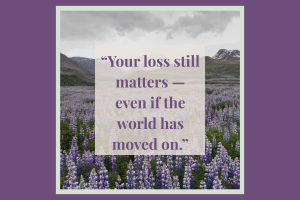Your Loss Still Matters — A Letter to the Woman Carrying Invisible Grief
I remember the exact moment I knew something was wrong with my first pregnancy.
It wasn’t dramatic. There was no sudden pain, no obvious sign. Just an absence — a quietness where there should have been… something.
The ultrasound confirmed it. No heartbeat.
And in that moment, something inside me shattered that I didn’t know could break.
What followed wasn’t just grief — it was isolation. Within weeks, people stopped asking how I was. They assumed I’d “moved on.” After all, it was early. I could try again.
But I hadn’t moved on. I was drowning.
If you’ve experienced pregnancy loss — miscarriage, stillbirth, or the ache of babies that never made it to term, I want you to know something:
Your loss still matters. Your grief is real.
And you don’t have to be “over it” to be okay.

You’re Not Alone (Even When It Feels Like You Are)
Here’s what the numbers won’t tell you, but I will: one in four pregnancies ends in miscarriage. One in four.
That means if you’ve lost a baby, you’re sitting in a room full of women who’ve walked this path, but most of us are silent about it.
Stillbirth affects one in 160 births. Infant loss touches countless families. Yet we rarely speak about it until someone else breaks the silence first.
I lost two babies before my son was born. Two.
And I spent years wondering if my grief “counted.” If I was allowed to still feel it. If it was “too much” or “too long.”
The answer, I learned after far too much suffering, is this:
Every loss counts. Every baby matters.
And there is no timeline for grief,
The Grief No One Warns You About
When I started researching pregnancy loss after my own experiences, I found something both validating and heartbreaking:
Up to 32% of women experience clinical anxiety in the months following pregnancy loss. Another 30% report depression. For some, symptoms of post-traumatic stress disorder (PTSD) emerge — intrusive thoughts, hypervigilance, emotional numbness.
But here’s what the research doesn’t capture: the isolation.
People don’t know what to say, so they say nothing. Or worse, they say things like:
These phrases, meant to comfort, often deepen the wound.
What I needed, and what you might need too, was for someone to simply say:
“At least you can get pregnant.”
“It wasn’t meant to be.”
“You can try again.”
“Everything happens for a reason.”
“Your baby mattered. Your grief is real. I’m here.”
What Actually Helps (From Someone Who’s Been There)
After my second loss, I knew I had to do the work of processing my grief, not rushing past it, not pretending I was fine, but actually honouring what I’d been through.
It took time. Years, actually. But here’s what I discovered, both from my own experience and from the research I’ve studied:
1. Resilience Doesn’t Mean “Getting Over It”
Resilience is often misunderstood. It’s not about bouncing back quickly or pretending you’re fine.
It’s the ability to carry grief without it destroying you.
2. Support Systems Aren’t Optional — They’re Essential
Women with strong emotional support — partners, friends, therapists, coaches, experience far better healing outcomes.
Tender, consistent care makes a measurable difference.
3. Seeking Help Is Strength, Not Failure
Asking for support doesn’t mean you’re broken. It means you’re brave enough to heal.
October 15th: A Day to Remember What the World Forgets
Every year on October 15th, Pregnancy and Infant Loss Remembrance Day invite us to break the silence.
At 7pm in every time zone, people around the world light candles, creating a Wave of Light that travels around the globe.
It’s a way of saying:
Your baby mattered. We remember. You’re not alone.
I light my candles for the two babies I lost, and for every woman carrying invisible grief, wondering if anyone else understands.
We do. I do.
A Final Word
October is Pregnancy and Infant Loss Awareness Month. But your grief doesn’t have to wait for October to be acknowledged.
Healing doesn’t mean forgetting. It means learning to carry your loss without it consuming you.
It means honouring your babies while opening yourself to hope again.
Your loss still matters.
Your baby still matters.
And you, exactly as you are, carrying this grief — you matter too. 💜








